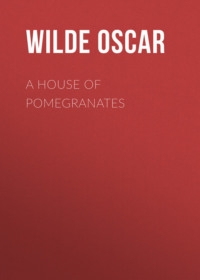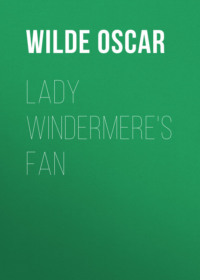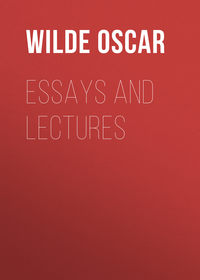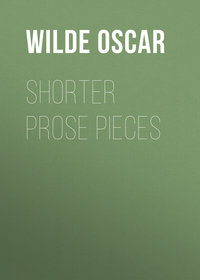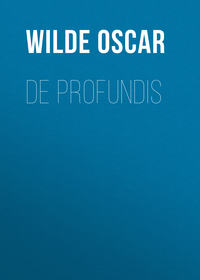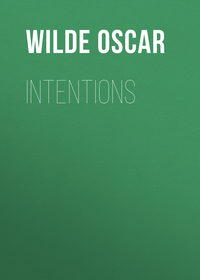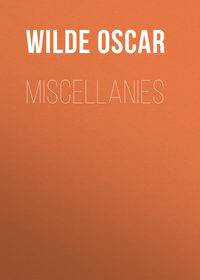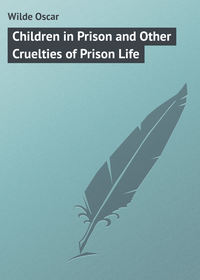Poems, with The Ballad of Reading Gaol
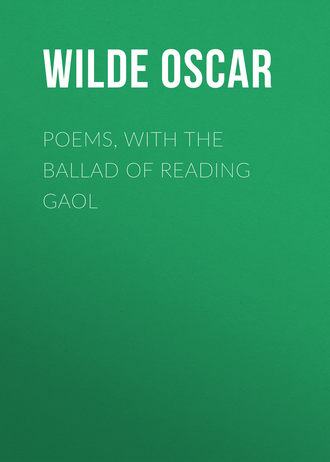 полная версия
полная версияPoems, with The Ballad of Reading Gaol
Жанр: зарубежная поэзиязарубежная классикастихи и поэзиялитература 19 векасерьезное чтениеcтихи, поэзия
Язык: Английский
Год издания: 2017
Добавлена:
Настройки чтения
Размер шрифта
Высота строк
Поля
THE BALLAD OF READING GAOL
IN MEMORIAMC. T. WSOMETIME TROOPER OF THE ROYAL HORSE GUARDSOBIIT H.M. PRISON, READING, BERKSHIREJULY 7, 1896IHe did not wear his scarlet coat, For blood and wine are red,And blood and wine were on his hands When they found him with the dead,The poor dead woman whom he loved, And murdered in her bed.He walked amongst the Trial Men In a suit of shabby grey;A cricket cap was on his head, And his step seemed light and gay;But I never saw a man who looked So wistfully at the day.I never saw a man who looked With such a wistful eyeUpon that little tent of blue Which prisoners call the sky,And at every drifting cloud that went With sails of silver by.I walked, with other souls in pain, Within another ring,And was wondering if the man had done A great or little thing,When a voice behind me whispered low, ‘That fellow’s got to swing.’Dear Christ! the very prison walls Suddenly seemed to reel,And the sky above my head became Like a casque of scorching steel;And, though I was a soul in pain, My pain I could not feel.I only knew what hunted thought Quickened his step, and whyHe looked upon the garish day With such a wistful eye;The man had killed the thing he loved, And so he had to die.Yet each man kills the thing he loves, By each let this be heard,Some do it with a bitter look, Some with a flattering word,The coward does it with a kiss, The brave man with a sword!Some kill their love when they are young, And some when they are old;Some strangle with the hands of Lust, Some with the hands of Gold:The kindest use a knife, because The dead so soon grow cold.Some love too little, some too long, Some sell, and others buy;Some do the deed with many tears, And some without a sigh:For each man kills the thing he loves, Yet each man does not die.He does not die a death of shame On a day of dark disgrace,Nor have a noose about his neck, Nor a cloth upon his face,Nor drop feet foremost through the floor Into an empty space.He does not sit with silent men Who watch him night and day;Who watch him when he tries to weep, And when he tries to pray;Who watch him lest himself should rob The prison of its prey.He does not wake at dawn to see Dread figures throng his room,The shivering Chaplain robed in white, The Sheriff stern with gloom,And the Governor all in shiny black, With the yellow face of Doom.He does not rise in piteous haste To put on convict-clothes,While some coarse-mouthed Doctor gloats, and notes Each new and nerve-twitched pose,Fingering a watch whose little ticks Are like horrible hammer-blows.He does not know that sickening thirst That sands one’s throat, beforeThe hangman with his gardener’s gloves Slips through the padded door,And binds one with three leathern thongs, That the throat may thirst no more.He does not bend his head to hear The Burial Office read,Nor, while the terror of his soul Tells him he is not dead,Cross his own coffin, as he moves Into the hideous shed.He does not stare upon the air Through a little roof of glass:He does not pray with lips of clay For his agony to pass;Nor feel upon his shuddering cheek The kiss of Caiaphas.IISix weeks our guardsman walked the yard, In the suit of shabby grey:His cricket cap was on his head, And his step seemed light and gay,But I never saw a man who looked So wistfully at the day.I never saw a man who looked With such a wistful eyeUpon that little tent of blue Which prisoners call the sky,And at every wandering cloud that trailed Its ravelled fleeces by.He did not wring his hands, as do Those witless men who dareTo try to rear the changeling Hope In the cave of black Despair:He only looked upon the sun, And drank the morning air.He did not wring his hands nor weep, Nor did he peek or pine,But he drank the air as though it held Some healthful anodyne;With open mouth he drank the sun As though it had been wine!And I and all the souls in pain, Who tramped the other ring,Forgot if we ourselves had done A great or little thing,And watched with gaze of dull amaze The man who had to swing.And strange it was to see him pass With a step so light and gay,And strange it was to see him look So wistfully at the day,And strange it was to think that he Had such a debt to pay.For oak and elm have pleasant leaves That in the springtime shoot:But grim to see is the gallows-tree, With its adder-bitten root,And, green or dry, a man must die Before it bears its fruit!The loftiest place is that seat of grace For which all worldlings try:But who would stand in hempen band Upon a scaffold high,And through a murderer’s collar take His last look at the sky?It is sweet to dance to violins When Love and Life are fair:To dance to flutes, to dance to lutes Is delicate and rare:But it is not sweet with nimble feet To dance upon the air!So with curious eyes and sick surmise We watched him day by day,And wondered if each one of us Would end the self-same way,For none can tell to what red Hell His sightless soul may stray.At last the dead man walked no more Amongst the Trial Men,And I knew that he was standing up In the black dock’s dreadful pen,And that never would I see his face In God’s sweet world again.Like two doomed ships that pass in storm We had crossed each other’s way:But we made no sign, we said no word, We had no word to say;For we did not meet in the holy night, But in the shameful day.A prison wall was round us both, Two outcast men we were:The world had thrust us from its heart, And God from out His care:And the iron gin that waits for Sin Had caught us in its snare.IIIIn Debtors’ Yard the stones are hard, And the dripping wall is high,So it was there he took the air Beneath the leaden sky,And by each side a Warder walked, For fear the man might die.Or else he sat with those who watched His anguish night and day;Who watched him when he rose to weep, And when he crouched to pray;Who watched him lest himself should rob Their scaffold of its prey.The Governor was strong upon The Regulations Act:The Doctor said that Death was but A scientific fact:And twice a day the Chaplain called, And left a little tract.And twice a day he smoked his pipe, And drank his quart of beer:His soul was resolute, and held No hiding-place for fear;He often said that he was glad The hangman’s hands were near.But why he said so strange a thing No Warder dared to ask:For he to whom a watcher’s doom Is given as his task,Must set a lock upon his lips, And make his face a mask.Or else he might be moved, and try To comfort or console:And what should Human Pity do Pent up in Murderers’ Hole?What word of grace in such a place Could help a brother’s soul?With slouch and swing around the ring We trod the Fools’ Parade!We did not care: we knew we were The Devil’s Own Brigade:And shaven head and feet of lead Make a merry masquerade.We tore the tarry rope to shreds With blunt and bleeding nails;We rubbed the doors, and scrubbed the floors, And cleaned the shining rails:And, rank by rank, we soaped the plank, And clattered with the pails.We sewed the sacks, we broke the stones, We turned the dusty drill:We banged the tins, and bawled the hymns, And sweated on the mill:But in the heart of every man Terror was lying still.So still it lay that every day Crawled like a weed-clogged wave:And we forgot the bitter lot That waits for fool and knave,Till once, as we tramped in from work, We passed an open grave.With yawning mouth the yellow hole Gaped for a living thing;The very mud cried out for blood To the thirsty asphalte ring:And we knew that ere one dawn grew fair Some prisoner had to swing.Right in we went, with soul intent On Death and Dread and Doom:The hangman, with his little bag, Went shuffling through the gloom:And each man trembled as he crept Into his numbered tomb.That night the empty corridors Were full of forms of Fear,And up and down the iron town Stole feet we could not hear,And through the bars that hide the stars White faces seemed to peer.He lay as one who lies and dreams In a pleasant meadow-land,The watchers watched him as he slept, And could not understandHow one could sleep so sweet a sleep With a hangman close at hand.But there is no sleep when men must weep Who never yet have wept:So we – the fool, the fraud, the knave — That endless vigil kept,And through each brain on hands of pain Another’s terror crept.Alas! it is a fearful thing To feel another’s guilt!For, right within, the sword of Sin Pierced to its poisoned hilt,And as molten lead were the tears we shed For the blood we had not spilt.The Warders with their shoes of felt Crept by each padlocked door,And peeped and saw, with eyes of awe, Grey figures on the floor,And wondered why men knelt to pray Who never prayed before.All through the night we knelt and prayed, Mad mourners of a corse!The troubled plumes of midnight were The plumes upon a hearse:And bitter wine upon a sponge Was the savour of Remorse.The grey cock crew, the red cock crew, But never came the day:And crooked shapes of Terror crouched, In the corners where we lay:And each evil sprite that walks by night Before us seemed to play.They glided past, they glided fast, Like travellers through a mist:They mocked the moon in a rigadoon Of delicate turn and twist,And with formal pace and loathsome grace The phantoms kept their tryst.With mop and mow, we saw them go, Slim shadows hand in hand:About, about, in ghostly rout They trod a saraband:And the damned grotesques made arabesques, Like the wind upon the sand!With the pirouettes of marionettes, They tripped on pointed tread:But with flutes of Fear they filled the ear, As their grisly masque they led,And loud they sang, and long they sang, For they sang to wake the dead.‘Oho!’ they cried, ‘The world is wide, But fettered limbs go lame!And once, or twice, to throw the dice Is a gentlemanly game,But he does not win who plays with Sin In the secret House of Shame.’No things of air these antics were, That frolicked with such glee:To men whose lives were held in gyves, And whose feet might not go free,Ah! wounds of Christ! they were living things, Most terrible to see.Around, around, they waltzed and wound; Some wheeled in smirking pairs;With the mincing step of a demirep Some sidled up the stairs:And with subtle sneer, and fawning leer, Each helped us at our prayers.The morning wind began to moan, But still the night went on:Through its giant loom the web of gloom Crept till each thread was spun:And, as we prayed, we grew afraid Of the Justice of the Sun.The moaning wind went wandering round The weeping prison-wall:Till like a wheel of turning steel We felt the minutes crawl:O moaning wind! what had we done To have such a seneschal?At last I saw the shadowed bars, Like a lattice wrought in lead,Move right across the whitewashed wall That faced my three-plank bed,And I knew that somewhere in the world God’s dreadful dawn was red.At six o’clock we cleaned our cells, At seven all was still,But the sough and swing of a mighty wing The prison seemed to fill,For the Lord of Death with icy breath Had entered in to kill.He did not pass in purple pomp, Nor ride a moon-white steed.Three yards of cord and a sliding board Are all the gallows’ need:So with rope of shame the Herald came To do the secret deed.We were as men who through a fen Of filthy darkness grope:We did not dare to breathe a prayer, Or to give our anguish scope:Something was dead in each of us, And what was dead was Hope.For Man’s grim Justice goes its way, And will not swerve aside:It slays the weak, it slays the strong, It has a deadly stride:With iron heel it slays the strong, The monstrous parricide!We waited for the stroke of eight: Each tongue was thick with thirst:For the stroke of eight is the stroke of Fate That makes a man accursed,And Fate will use a running noose For the best man and the worst.We had no other thing to do, Save to wait for the sign to come:So, like things of stone in a valley lone, Quiet we sat and dumb:But each man’s heart beat thick and quick, Like a madman on a drum!With sudden shock the prison-clock Smote on the shivering air,And from all the gaol rose up a wail Of impotent despair,Like the sound that frightened marshes hear From some leper in his lair.And as one sees most fearful things In the crystal of a dream,We saw the greasy hempen rope Hooked to the blackened beam,And heard the prayer the hangman’s snare Strangled into a scream.And all the woe that moved him so That he gave that bitter cry,And the wild regrets, and the bloody sweats, None knew so well as I:For he who lives more lives than one More deaths than one must die.IVThere is no chapel on the day On which they hang a man:The Chaplain’s heart is far too sick, Or his face is far too wan,Or there is that written in his eyes Which none should look upon.So they kept us close till nigh on noon, And then they rang the bell,And the Warders with their jingling keys Opened each listening cell,And down the iron stair we tramped, Each from his separate Hell.Out into God’s sweet air we went, But not in wonted way,For this man’s face was white with fear, And that man’s face was grey,And I never saw sad men who looked So wistfully at the day.I never saw sad men who looked With such a wistful eyeUpon that little tent of blue We prisoners called the sky,And at every careless cloud that passed In happy freedom by.But there were those amongst us all Who walked with downcast head,And knew that, had each got his due, They should have died instead:He had but killed a thing that lived, Whilst they had killed the dead.For he who sins a second time Wakes a dead soul to pain,And draws it from its spotted shroud, And makes it bleed again,And makes it bleed great gouts of blood, And makes it bleed in vain!Like ape or clown, in monstrous garb With crooked arrows starred,Silently we went round and round The slippery asphalte yard;Silently we went round and round, And no man spoke a word.Silently we went round and round, And through each hollow mindThe Memory of dreadful things Rushed like a dreadful wind,And Horror stalked before each man, And Terror crept behind.The Warders strutted up and down, And kept their herd of brutes,Their uniforms were spick and span, And they wore their Sunday suits,But we knew the work they had been at, By the quicklime on their boots.For where a grave had opened wide, There was no grave at all:Only a stretch of mud and sand By the hideous prison-wall,And a little heap of burning lime, That the man should have his pall.For he has a pall, this wretched man, Such as few men can claim:Deep down below a prison-yard, Naked for greater shame,He lies, with fetters on each foot, Wrapt in a sheet of flame!And all the while the burning lime Eats flesh and bone away,It eats the brittle bone by night, And the soft flesh by day,It eats the flesh and bone by turns, But it eats the heart alway.For three long years they will not sow Or root or seedling there:For three long years the unblessed spot Will sterile be and bare,And look upon the wondering sky With unreproachful stare.They think a murderer’s heart would taint Each simple seed they sow.It is not true! God’s kindly earth Is kindlier than men know,And the red rose would but blow more red, The white rose whiter blow.Out of his mouth a red, red rose! Out of his heart a white!For who can say by what strange way, Christ brings His will to light,Since the barren staff the pilgrim bore Bloomed in the great Pope’s sight?But neither milk-white rose nor red May bloom in prison-air;The shard, the pebble, and the flint, Are what they give us there:For flowers have been known to heal A common man’s despair.So never will wine-red rose or white, Petal by petal, fallOn that stretch of mud and sand that lies By the hideous prison-wall,To tell the men who tramp the yard That God’s Son died for all.Yet though the hideous prison-wall Still hems him round and round,And a spirit may not walk by night That is with fetters bound,And a spirit may but weep that lies In such unholy ground,He is at peace – this wretched man — At peace, or will be soon:There is no thing to make him mad, Nor does Terror walk at noon,For the lampless Earth in which he lies Has neither Sun nor Moon.They hanged him as a beast is hanged: They did not even tollA requiem that might have brought Rest to his startled soul,But hurriedly they took him out, And hid him in a hole.They stripped him of his canvas clothes, And gave him to the flies:They mocked the swollen purple throat, And the stark and staring eyes:And with laughter loud they heaped the shroud In which their convict lies.The Chaplain would not kneel to pray By his dishonoured grave:Nor mark it with that blessed Cross That Christ for sinners gave,Because the man was one of those Whom Christ came down to save.Yet all is well; he has but passed To Life’s appointed bourne:And alien tears will fill for him Pity’s long-broken urn,For his mourners will be outcast men, And outcasts always mournVI know not whether Laws be right, Or whether Laws be wrong;All that we know who lie in gaol Is that the wall is strong;And that each day is like a year, A year whose days are long.But this I know, that every Law That men have made for Man,Since first Man took his brother’s life, And the sad world began,But straws the wheat and saves the chaff With a most evil fan.This too I know – and wise it were If each could know the same —That every prison that men build Is built with bricks of shame,And bound with bars lest Christ should see How men their brothers maim.With bars they blur the gracious moon, And blind the goodly sun:And they do well to hide their Hell, For in it things are doneThat Son of God nor son of Man Ever should look upon!The vilest deeds like poison weeds, Bloom well in prison-air;It is only what is good in Man That wastes and withers there:Pale Anguish keeps the heavy gate, And the Warder is Despair.For they starve the little frightened child Till it weeps both night and day:And they scourge the weak, and flog the fool, And gibe the old and grey,And some grow mad, and all grow bad, And none a word may say.Each narrow cell in which we dwell Is a foul and dark latrine,And the fetid breath of living Death Chokes up each grated screen,And all, but Lust, is turned to dust In Humanity’s machine.The brackish water that we drink Creeps with a loathsome slime,And the bitter bread they weigh in scales Is full of chalk and lime,And Sleep will not lie down, but walks Wild-eyed, and cries to Time.But though lean Hunger and green Thirst Like asp with adder fight,We have little care of prison fare, For what chills and kills outrightIs that every stone one lifts by day Becomes one’s heart by night.With midnight always in one’s heart, And twilight in one’s cell,We turn the crank, or tear the rope, Each in his separate Hell,And the silence is more awful far Than the sound of a brazen bell.And never a human voice comes near To speak a gentle word:And the eye that watches through the door Is pitiless and hard:And by all forgot, we rot and rot, With soul and body marred.And thus we rust Life’s iron chain Degraded and alone:And some men curse, and some men weep, And some men make no moan:But God’s eternal Laws are kind And break the heart of stone.And every human heart that breaks, In prison-cell or yard,Is as that broken box that gave Its treasure to the Lord,And filled the unclean leper’s house With the scent of costliest nard.Ah! happy they whose hearts can break And peace of pardon win!How else may man make straight his plan And cleanse his soul from Sin?How else but through a broken heart May Lord Christ enter in?And he of the swollen purple throat, And the stark and staring eyes,Waits for the holy hands that took The Thief to Paradise;And a broken and a contrite heart The Lord will not despise.The man in red who reads the Law Gave him three weeks of life,Three little weeks in which to heal His soul of his soul’s strife,And cleanse from every blot of blood The hand that held the knife.And with tears of blood he cleansed the hand, The hand that held the steel:For only blood can wipe out blood, And only tears can heal:And the crimson stain that was of Cain Became Christ’s snow-white seal.VIIn Reading gaol by Reading town There is a pit of shame,And in it lies a wretched man Eaten by teeth of flame,In a burning winding-sheet he lies, And his grave has got no name.And there, till Christ call forth the dead, In silence let him lie:No need to waste the foolish tear, Or heave the windy sigh:The man had killed the thing he loved, And so he had to die.And all men kill the thing they love, By all let this be heard,Some do it with a bitter look, Some with a flattering word,The coward does it with a kiss, The brave man with a sword!RAVENNA
Newdigate Prize PoemRecited in the Sheldonian TheatreOxfordJune 26th, 1878TO MY FRIENDGEORGE FLEMINGAUTHOR OF‘THE NILE NOVEL’ AND ‘MIRAGE’ Ravenna, March 1877 Oxford, March 1878IA year ago I breathed the Italian air, —And yet, methinks this northern Spring is fair, —These fields made golden with the flower of March,The throstle singing on the feathered larch,The cawing rooks, the wood-doves fluttering by,The little clouds that race across the sky;And fair the violet’s gentle drooping head,The primrose, pale for love uncomforted,The rose that burgeons on the climbing briar,The crocus-bed, (that seems a moon of fireRound-girdled with a purple marriage-ring);And all the flowers of our English Spring,Fond snowdrops, and the bright-starred daffodil.Up starts the lark beside the murmuring mill,And breaks the gossamer-threads of early dew;And down the river, like a flame of blue,Keen as an arrow flies the water-king,While the brown linnets in the greenwood sing.A year ago! – it seems a little timeSince last I saw that lordly southern clime,Where flower and fruit to purple radiance blow,And like bright lamps the fabled apples glow.Full Spring it was – and by rich flowering vines,Dark olive-groves and noble forest-pines,I rode at will; the moist glad air was sweet,The white road rang beneath my horse’s feet,And musing on Ravenna’s ancient name,I watched the day till, marked with wounds of flame,The turquoise sky to burnished gold was turned. O how my heart with boyish passion burned,When far away across the sedge and mereI saw that Holy City rising clear,Crowned with her crown of towers! – On and onI galloped, racing with the setting sun,And ere the crimson after-glow was passed,I stood within Ravenna’s walls at last!II How strangely still! no sound of life or joyStartles the air; no laughing shepherd-boyPipes on his reed, nor ever through the dayComes the glad sound of children at their play:O sad, and sweet, and silent! surely hereA man might dwell apart from troublous fear,Watching the tide of seasons as they flowFrom amorous Spring to Winter’s rain and snow,And have no thought of sorrow; – here, indeed,Are Lethe’s waters, and that fatal weedWhich makes a man forget his fatherland. Ay! amid lotus-meadows dost thou stand,Like Proserpine, with poppy-laden head,Guarding the holy ashes of the dead.For though thy brood of warrior sons hath ceased,Thy noble dead are with thee! – they at leastAre faithful to thine honour: – guard them well,O childless city! for a mighty spell,To wake men’s hearts to dreams of things sublime,Are the lone tombs where rest the Great of Time.III Yon lonely pillar, rising on the plain,Marks where the bravest knight of France was slain, —The Prince of chivalry, the Lord of war,Gaston de Foix: for some untimely starLed him against thy city, and he fell,As falls some forest-lion fighting well.Taken from life while life and love were new,He lies beneath God’s seamless veil of blue;Tall lance-like reeds wave sadly o’er his head,And oleanders bloom to deeper red,Where his bright youth flowed crimson on the ground. Look farther north unto that broken mound, —There, prisoned now within a lordly tombRaised by a daughter’s hand, in lonely gloom,Huge-limbed Theodoric, the Gothic king,Sleeps after all his weary conquering.Time hath not spared his ruin, – wind and rainHave broken down his stronghold; and againWe see that Death is mighty lord of all,And king and clown to ashen dust must fall Mighty indeed their glory! yet to meBarbaric king, or knight of chivalry,Or the great queen herself, were poor and vain,Beside the grave where Dante rests from pain.His gilded shrine lies open to the air;And cunning sculptor’s hands have carven thereThe calm white brow, as calm as earliest morn,The eyes that flashed with passionate love and scorn,The lips that sang of Heaven and of Hell,The almond-face which Giotto drew so well,The weary face of Dante; – to this day,Here in his place of resting, far awayFrom Arno’s yellow waters, rushing downThrough the wide bridges of that fairy town,Where the tall tower of Giotto seems to riseA marble lily under sapphire skies!Alas! my Dante! thou hast known the painOf meaner lives, – the exile’s galling chain,How steep the stairs within kings’ houses are,And all the petty miseries which marMan’s nobler nature with the sense of wrong.Yet this dull world is grateful for thy song;Our nations do thee homage, – even she,That cruel queen of vine-clad Tuscany,Who bound with crown of thorns thy living brow,Hath decked thine empty tomb with laurels now,And begs in vain the ashes of her son. O mightiest exile! all thy grief is done:Thy soul walks now beside thy Beatrice;Ravenna guards thine ashes: sleep in peace.IV How lone this palace is; how grey the walls!No minstrel now wakes echoes in these halls.The broken chain lies rusting on the door,And noisome weeds have split the marble floor:Here lurks the snake, and here the lizards runBy the stone lions blinking in the sun.Byron dwelt here in love and revelryFor two long years – a second Anthony,Who of the world another Actium made!Yet suffered not his royal soul to fade,Or lyre to break, or lance to grow less keen,’Neath any wiles of an Egyptian queen.For from the East there came a mighty cry,And Greece stood up to fight for Liberty,And called him from Ravenna: never knightRode forth more nobly to wild scenes of fight!None fell more bravely on ensanguined field,Borne like a Spartan back upon his shield!O Hellas! Hellas! in thine hour of pride,Thy day of might, remember him who diedTo wrest from off thy limbs the trammelling chain:O Salamis! O lone Platæan plain!O tossing waves of wild Euboean sea!O wind-swept heights of lone Thermopylæ!He loved you well – ay, not alone in word,Who freely gave to thee his lyre and sword,Like Æschylos at well-fought Marathon: And England, too, shall glory in her son,Her warrior-poet, first in song and fight.No longer now shall Slander’s venomed spiteCrawl like a snake across his perfect name,Or mar the lordly scutcheon of his fame. For as the olive-garland of the race,Which lights with joy each eager runner’s face,As the red cross which saveth men in war,As a flame-bearded beacon seen from farBy mariners upon a storm-tossed sea, —Such was his love for Greece and Liberty! Byron, thy crowns are ever fresh and green:Red leaves of rose from Sapphic MityleneShall bind thy brows; the myrtle blooms for thee,In hidden glades by lonely Castaly;The laurels wait thy coming: all are thine,And round thy head one perfect wreath will twine.V The pine-tops rocked before the evening breezeWith the hoarse murmur of the wintry seas,And the tall stems were streaked with amber bright; —I wandered through the wood in wild delight,Some startled bird, with fluttering wings and fleet,Made snow of all the blossoms; at my feet,Like silver crowns, the pale narcissi lay,And small birds sang on every twining spray.O waving trees, O forest liberty!Within your haunts at least a man is free,And half forgets the weary world of strife:The blood flows hotter, and a sense of lifeWakes i’ the quickening veins, while once againThe woods are filled with gods we fancied slain.Long time I watched, and surely hoped to seeSome goat-foot Pan make merry minstrelsyAmid the reeds! some startled Dryad-maidIn girlish flight! or lurking in the glade,The soft brown limbs, the wanton treacherous faceOf woodland god! Queen Dian in the chase,White-limbed and terrible, with look of pride,And leash of boar-hounds leaping at her side!Or Hylas mirrored in the perfect stream. O idle heart! O fond Hellenic dream!Ere long, with melancholy rise and swell,The evening chimes, the convent’s vesper bell,Struck on mine ears amid the amorous flowers.Alas! alas! these sweet and honied hoursHad whelmed my heart like some encroaching sea,And drowned all thoughts of black Gethsemane.VI O lone Ravenna! many a tale is toldOf thy great glories in the days of old:Two thousand years have passed since thou didst seeCæsar ride forth to royal victory.Mighty thy name when Rome’s lean eagles flewFrom Britain’s isles to far Euphrates blue;And of the peoples thou wast noble queen,Till in thy streets the Goth and Hun were seen.Discrowned by man, deserted by the sea,Thou sleepest, rocked in lonely misery!No longer now upon thy swelling tide,Pine-forest-like, thy myriad galleys ride!For where the brass-beaked ships were wont to float,The weary shepherd pipes his mournful note;And the white sheep are free to come and goWhere Adria’s purple waters used to flow. O fair! O sad! O Queen uncomforted!In ruined loveliness thou liest dead,Alone of all thy sisters; for at lastItalia’s royal warrior hath passedRome’s lordliest entrance, and hath worn his crownIn the high temples of the Eternal Town!The Palatine hath welcomed back her king,And with his name the seven mountains ring! And Naples hath outlived her dream of pain,And mocks her tyrant! Venice lives again,New risen from the waters! and the cryOf Light and Truth, of Love and Liberty,Is heard in lordly Genoa, and whereThe marble spires of Milan wound the air,Rings from the Alps to the Sicilian shore,And Dante’s dream is now a dream no more. But thou, Ravenna, better loved than all,Thy ruined palaces are but a pallThat hides thy fallen greatness! and thy nameBurns like a grey and flickering candle-flameBeneath the noonday splendour of the sunOf new Italia! for the night is done,The night of dark oppression, and the dayHath dawned in passionate splendour: far awayThe Austrian hounds are hunted from the land,Beyond those ice-crowned citadels which standGirdling the plain of royal Lombardy,From the far West unto the Eastern sea. I know, indeed, that sons of thine have diedIn Lissa’s waters, by the mountain-sideOf Aspromonte, on Novara’s plain, —Nor have thy children died for thee in vain:And yet, methinks, thou hast not drunk this wineFrom grapes new-crushed of Liberty divine,Thou hast not followed that immortal StarWhich leads the people forth to deeds of war.Weary of life, thou liest in silent sleep,As one who marks the lengthening shadows creep,Careless of all the hurrying hours that run,Mourning some day of glory, for the sunOf Freedom hath not shewn to thee his face,And thou hast caught no flambeau in the race. Yet wake not from thy slumbers, – rest thee well,Amidst thy fields of amber asphodel,Thy lily-sprinkled meadows, – rest thee there,To mock all human greatness: who would dareTo vent the paltry sorrows of his lifeBefore thy ruins, or to praise the strifeOf kings’ ambition, and the barren prideOf warring nations! wert not thou the BrideOf the wild Lord of Adria’s stormy sea!The Queen of double Empires! and to theeWere not the nations given as thy prey!And now – thy gates lie open night and day,The grass grows green on every tower and hall,The ghastly fig hath cleft thy bastioned wall;And where thy mailèd warriors stood at restThe midnight owl hath made her secret nest.O fallen! fallen! from thy high estate,O city trammelled in the toils of Fate,Doth nought remain of all thy glorious days,But a dull shield, a crown of withered bays! Yet who beneath this night of wars and fears,From tranquil tower can watch the coming years;Who can foretell what joys the day shall bring,Or why before the dawn the linnets sing?Thou, even thou, mayst wake, as wakes the roseTo crimson splendour from its grave of snows;As the rich corn-fields rise to red and goldFrom these brown lands, now stiff with Winter’s cold;As from the storm-rack comes a perfect star! O much-loved city! I have wandered farFrom the wave-circled islands of my home;Have seen the gloomy mystery of the DomeRise slowly from the drear Campagna’s way,Clothed in the royal purple of the day:I from the city of the violet crownHave watched the sun by Corinth’s hill go down,And marked the ‘myriad laughter’ of the seaFrom starlit hills of flower-starred Arcady;Yet back to thee returns my perfect love,As to its forest-nest the evening dove. O poet’s city! one who scarce has seenSome twenty summers cast their doublets greenFor Autumn’s livery, would seek in vainTo wake his lyre to sing a louder strain,Or tell thy days of glory; – poor indeedIs the low murmur of the shepherd’s reed,Where the loud clarion’s blast should shake the sky,And flame across the heavens! and to trySuch lofty themes were folly: yet I knowThat never felt my heart a nobler glowThan when I woke the silence of thy streetWith clamorous trampling of my horse’s feet,And saw the city which now I try to sing,After long days of weary travelling.VII Adieu, Ravenna! but a year ago,I stood and watched the crimson sunset glowFrom the lone chapel on thy marshy plain:The sky was as a shield that caught the stainOf blood and battle from the dying sun,And in the west the circling clouds had spunA royal robe, which some great God might wear,While into ocean-seas of purple airSank the gold galley of the Lord of Light. Yet here the gentle stillness of the nightBrings back the swelling tide of memory,And wakes again my passionate love for thee:Now is the Spring of Love, yet soon will comeOn meadow and tree the Summer’s lordly bloom;And soon the grass with brighter flowers will blow,And send up lilies for some boy to mow.Then before long the Summer’s conqueror,Rich Autumn-time, the season’s usurer,Will lend his hoarded gold to all the trees,And see it scattered by the spendthrift breeze;And after that the Winter cold and drear.So runs the perfect cycle of the year.And so from youth to manhood do we go,And fall to weary days and locks of snow.Love only knows no winter; never dies:Nor cares for frowning storms or leaden skiesAnd mine for thee shall never pass away,Though my weak lips may falter in my lay. Adieu! Adieu! yon silent evening star,The night’s ambassador, doth gleam afar,And bid the shepherd bring his flocks to fold.Perchance before our inland seas of goldAre garnered by the reapers into sheaves,Perchance before I see the Autumn leaves,I may behold thy city; and lay downLow at thy feet the poet’s laurel crown. Adieu! Adieu! yon silver lamp, the moon,Which turns our midnight into perfect noon,Doth surely light thy towers, guarding wellWhere Dante sleeps, where Byron loved to dwell.

